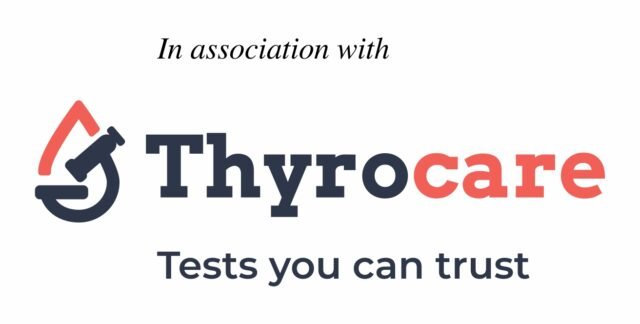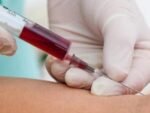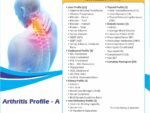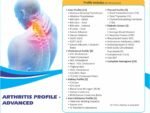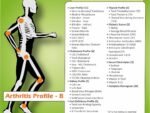Showing 1–9 of 18 results
-
6%
ANA SCREENING (IMMUNOFLUORESCENCE)
An ANA (antinuclear antibody) test using immunofluorescence measures the presence and amount of antinuclear antibodies in the blood, which can indicate an overactive immune system and potentially autoimmune diseases. The test results are reported as a titer (a measure of the antibody level) and a staining pattern.
Here’s a more detailed explanation:What is an ANA test?-
-
Purpose:
The ANA test is a blood test that detects antinuclear antibodies (ANAs) in the blood.
-
-
What are ANAs?
ANAs are antibodies that mistakenly target the nucleus of the body’s own cells, potentially leading to inflammation and autoimmune conditions.
-
How it works:
The test typically uses an indirect immunofluorescence assay (IFA), where a sample of your blood is mixed with a fluorescent dye-labeled antibody that binds to the ANAs, if present.
-
What the test measures:
The test measures the level of ANAs in your blood, which is reported as a titer.
-
Why is it important?
A positive ANA test can suggest an autoimmune disorder, but it’s not a definitive diagnosis and further testing is often needed.
What does the ANA titer mean?-
Titer:
The titer is a measure of the amount of ANAs in your blood, expressed as a ratio (e.g., 1:40, 1:80, 1:160).
-
Higher titer:
A higher titer indicates a greater amount of ANAs, which may be more indicative of an autoimmune condition.
-
Normal vs. Abnormal:
While some healthy individuals may have low levels of ANAs, a high titer is more likely to suggest an autoimmune disorder.
-
Cutoff:
Some labs may consider a titer above a certain level (e.g., 1:160) as positive, but this can vary.
What are the staining patterns?-
Besides the titer, the test also identifies a staining pattern:This pattern describes how the fluorescent dye binds to the cell nuclei, which can provide clues about the type of autoimmune condition.
-
Common patterns:
Some common patterns include homogeneous, speckled, centromere, and others.
When is an ANA test ordered?-
Symptoms:
Your doctor may order an ANA test if you have symptoms of an autoimmune disease, such as fatigue, joint pain, skin rashes, or other symptoms.
-
Autoimmune disorders:
ANA tests are often used to help diagnose autoimmune diseases like Systemic Lupus Erythematosus (SLE or lupus), Rheumatoid Arthritis, and other connective tissue disorders.
₹800.00Original price was: ₹800.00.₹750.00Current price is: ₹750.00. -
-
15%
ANTI CYCLIC CITRULLINATED PEPTIDE; ANTI CCP
About this packageAnti-Cyclic Citrullinated Peptide is an antibody found to be present in individuals with rheumatoid arthritis (RA). Measuring its levels helps in detecting as well as assessing the severity of RA. This test is available at an affordable price with home collection services.
Benefit Contact Us Get Additional Discount On Anti Ccp (Accp) Get Additional Discount Anti-cyclic citrullinated peptide (CCP) is a blood test that screens for antibodies that attack healthy cells. It’s a common diagnostic tool for rheumatoid arthritis (RA).
What is it used for?- To diagnose or rule out RA
- To predict the severity of RA
- To monitor patients with inflammatory polyarthritis (IP)
What are the symptoms of RA?
- Joint pain, especially in the morning
- Joint stiffness
- Joint swelling
- Fatigue
- Low-grade fever
What are the results of the test?
- Negative: Less than 20 EU/mL
- Weakly positive: 20–39 EU/mL
- Moderately positive: 40–59 EU/mL
- Strongly positive: More than 59 EU/mL
What else can cause a positive result? Systemic lupus erythematosus (SLE), Familial Mediterranean fever, Behçet’s disease, and Psoriatic arthritis.
Other information- CCP antibodies are a type of autoantibody
- CCP antibody tests are often done with rheumatoid factor (RF) tests
- CCP antibody testing results may be available within a few business days
₹1,420.00Original price was: ₹1,420.00.₹1,200.00Current price is: ₹1,200.00. -
31%
ANTI NUCLEAR ANTIBODIES (ANA)
About this packageANAs are a special class of autoantibodies that bind and destroy certain parts in the nucleus of the cell. Although a little amount of ANA is found in the normal population, an increased level is normally observed in people with connective tissue disease (CTD). Book ANA test at an affordable price, with a free home collection from Thyrocare.
Benefit Contact Us Get Additional Discount On Anti Nuclear Antibodies (Ana) Get Additional Discount Antinuclear antibodies (ANA) are autoantibodies that bind to components within the cell nucleus, and a positive ANA test can indicate an autoimmune condition, though it’s not specific for any particular disease.
Here’s a more detailed explanation:-
-
What are ANAs?
ANAs are a type of autoantibody, meaning they are antibodies that your immune system mistakenly produces against your own body’s tissues.
-
What do they target?
Specifically, ANAs target the cell nucleus, which contains DNA and other important components.
-
-
Why are they important?
A positive ANA test can be a sign of an autoimmune disease, where the immune system attacks healthy cells and tissues.
-
What diseases are they associated with?
ANAs are often associated with autoimmune diseases like systemic lupus erythematosus (SLE), Sjögren’s syndrome, and systemic sclerosis (SSc), among others.
-
What is the ANA test?
The ANA test is a blood test that looks for the presence and amount of antinuclear antibodies in your blood.
-
What does a positive ANA test mean?
A positive ANA test means that the test detected a higher-than-normal level of antinuclear antibodies in your blood.
-
What are the next steps?
A positive ANA test may indicate a need for follow up blood tests, physical exam, and a review of history and symptoms.
-
Is a positive ANA test always a sign of an autoimmune disease?
No, not always. Many healthy individuals can have detectable levels of ANAs, and the presence of ANAs alone doesn’t necessarily mean you have an autoimmune disease.
-
How is the ANA test used?
The ANA test is used as a screening tool for autoimmune diseases, but it’s important to note that a positive ANA test doesn’t confirm a specific diagnosis.
-
What are the next steps if you have a positive ANA test?
If you have a positive ANA test, your doctor may order further tests to help determine the cause of the elevated ANA levels and to rule out or confirm specific autoimmune diseases.
-
What are some other tests that may be ordered?These tests may include tests for specific antibodies, blood tests for inflammation, and a physical exam.
₹730.00Original price was: ₹730.00.₹500.00Current price is: ₹500.00. -
-
6%
ANTI NUCLEAR ANTIBODY / FACTOR (ANA/ANF), EIA
Antinuclear antibodies (ANA) are a type of antibody that can indicate autoimmune disorders. The ANA test is a blood test that measures the amount of ANA in your blood.
What is ANA?- ANA are a type of autoantibody that bind to the nucleus of cells
- The nucleus is responsible for sending signals that control cell functions
- ANA are a defining feature of autoimmune connective tissue disease
What conditions are associated with ANA? Systemic lupus erythematosus (SLE), Sjogren’s syndrome, Polymyositis/dermatomyositis, and Rheumatoid arthritis.
How is the ANA test performed?
- The ANA test can be performed using indirect immunofluorescence (IIF) or solid-phase assays
- The IIF technique is the most common method used to detect ANA
- The ANA test measures the titer of ANA, which is the amount of autoantibodies in the blood
What do the results mean?- A positive ANA test indicates the presence of autoantibodies, but it doesn’t necessarily mean you have an autoimmune disease
- A high titer of ANA is characteristic of people with connective tissue disorders
₹800.00Original price was: ₹800.00.₹750.00Current price is: ₹750.00. - ANA are a type of autoantibody that bind to the nucleus of cells
-
24%
ANTINUCLEAR ANTIBODIES-17 BLOT(Immunoblot)
An antinuclear antibodies (ANA) 17 blot test, also known as an ANA-17 Pro test, is a blood test used to detect autoantibodies that target specific antigens within the cell nucleus, helping diagnose and differentiate between various autoimmune diseases.
Here’s a more detailed explanation:What it is:-
-
ANA Blot 17 antigens test:
This test detects the presence of antinuclear antibodies (ANAs) in the blood, which are autoantibodies that the body produces that attack its own healthy cells.
-
-
Purpose:
It helps diagnose and differentiate between various autoimmune diseases, including systemic lupus erythematosus (SLE), Sjogren’s syndrome, mixed connective tissue disease (MCTD), scleroderma, and others.
-
How it works:
The test uses a strip with 17 specific antigens, allowing for the identification of antibodies against these antigens, which can help determine the type of autoimmune condition.
-
Antigens:
The test detects antibodies against antigens like dsDNA, nucleosomes, histones, rib, SS-A, Ro-52, Scl-70, and PM-Scl.
-
Interpretation:
A positive result indicates the presence of ANAs, suggesting a possible autoimmune disease.
Why it’s done:-
Diagnosis:To help diagnose autoimmune diseases when symptoms like joint pain, fatigue, fever, and skin rashes are present.
-
Confirmation:To confirm a diagnosis after a preliminary ANA screening test (like ANA IFA or ELISA) is positive.
-
Differentiation:
To help differentiate between different autoimmune conditions based on the specific antibodies detected.
Important Considerations:-
Positive Results:
A positive ANA test result doesn’t necessarily mean you have an autoimmune disease, as many healthy individuals also have ANAs in their blood.
-
Further Testing:A positive ANA test often requires further testing to determine the specific type of autoimmune disease and the severity of the condition.
.
₹3,300.00Original price was: ₹3,300.00.₹2,500.00Current price is: ₹2,500.00. -
-
27%
ARTHRITIS PROFILE
An arthritis profile is a series of blood tests used to help diagnose and assess arthritis, focusing on inflammatory markers and autoimmune activity. It can help determine the type and severity of arthritis and guide treatment plans.
Here’s a more detailed explanation:-
-
Purpose:
The arthritis profile helps doctors understand the underlying causes of arthritis, differentiate between different types (like rheumatoid arthritis and osteoarthritis), and monitor the effectiveness of treatment.
-
-
Tests Included:
Common tests in an arthritis profile include:
- C-reactive protein (CRP): A marker of inflammation in the body.
-
- Erythrocyte sedimentation rate (ESR): Another marker of inflammation.
-
- Rheumatoid factor (RF): A protein found in the blood of people with rheumatoid arthritis.
-
- Anti-CCP antibodies: A type of autoantibody found in people with rheumatoid arthritis.
-
- Antinuclear antibodies (ANA): Autoantibodies that can be elevated in various autoimmune conditions.
-
- Complete blood count (CBC): A general blood test that can reveal signs of inflammation or infection.
-
- Uric acid: Elevated levels can indicate gout, a type of arthritis.
-
- Antistreptolysin O (ASO): An antibody that can be elevated after a streptococcal infection, which can sometimes trigger arthritis.
-
-
How it’s done:
The arthritis profile is typically a blood test, but may also include a urine sample.
-
Interpreting Results:
Elevated levels of inflammatory markers (CRP, ESR) or the presence of certain autoantibodies (RF, anti-CCP) can suggest arthritis or other autoimmune conditions.
-
Types of Arthritis:The tests can help differentiate between different types of arthritis, such as rheumatoid arthritis, osteoarthritis, psoriatic arthritis, and other inflammatory conditions.
₹4,850.00Original price was: ₹4,850.00.₹3,500.00Current price is: ₹3,500.00. -
-
1%
ARTHRITIS PROFILE – A
Arthritic disorders affect majority of the population, varying in severity. Many of these disorders are self limiting conditions requiring minimal evaluation and symptomatic therapy. However several patients show persistent musculo-skeletal symptoms that requires laboratory testing to establish diagnosis and document the pathological process. Complement mediated immune complex deposition may also result in arthritic changes.
₹3,050.00Original price was: ₹3,050.00.₹3,000.00Current price is: ₹3,000.00. -
1%
ARTHRITIS PROFILE – ADVANCED
Arthritic disorders affect majority of the population, varying in severity. Many of these disorders are self limiting conditions requiring minimal evaluation and symptomatic therapy. However several patients show persistent musculo-skeletal symptoms that requires laboratory testing to establish diagnosis and document the pathological process. Complement mediated immune complex deposition may also result in arthritic changes.
₹4,050.00Original price was: ₹4,050.00.₹4,000.00Current price is: ₹4,000.00. -
1%
ARTHRITIS PROFILE – B
An Arthritis Profile – B test is a blood test panel that helps assess inflammation and identify potential causes of arthritis, including rheumatoid arthritis, by analyzing markers like ESR, CRP, rheumatoid factor (RF), and anti-CCP.Here’s a more detailed explanation:What it tests for:- Erythrocyte Sedimentation Rate (ESR): Measures how quickly red blood cells settle in a tube, indicating inflammation.
- C-Reactive Protein (CRP): A protein released by the liver during inflammation, indicating the body’s inflammatory response.
- Rheumatoid Factor (RF): An antibody found in some people with rheumatoid arthritis.
- Anti-CCP (Anti-Cyclic Citrullinated Peptide): Another antibody that can be a marker for rheumatoid arthritis.
- Complete Blood Count (CBC): Provides a general overview of blood cell counts, which can help identify other potential issues.
- ANA (if): This blood test helps detect presence of antinuclear antibodies (ANA) in blood that attack components of cells and lead to inflammation
- Serum calcium, 24-hour urine phosphorus, serum urea acid, dihydroxyvitamin D
Why it’s important:- Diagnosis: Helps doctors determine if someone has arthritis or other inflammatory conditions.
- Monitoring: Can track the progression of arthritis and the effectiveness of treatment.
- Identifying the type of arthritis: Helps differentiate between different types of arthritis, such as rheumatoid arthritis and osteoarthritis.
- Assessing inflammation: Helps determine the severity of inflammation in the body.
₹4,550.00Original price was: ₹4,550.00.₹4,500.00Current price is: ₹4,500.00.

